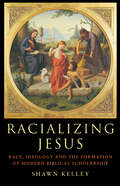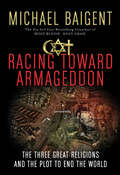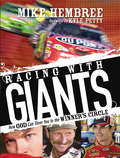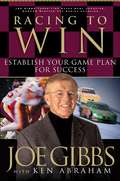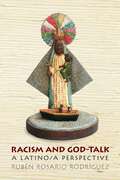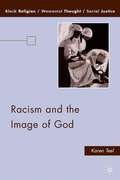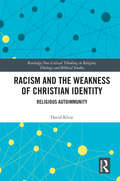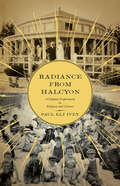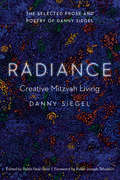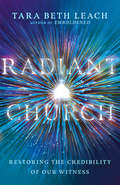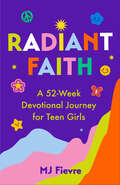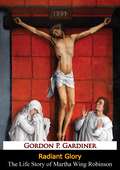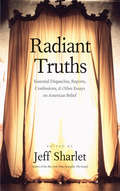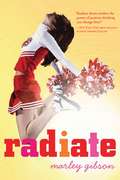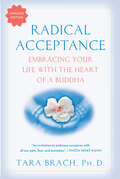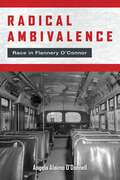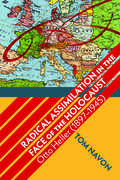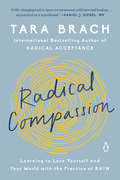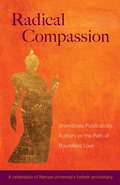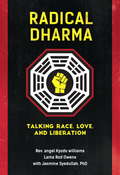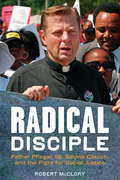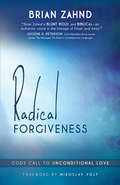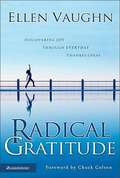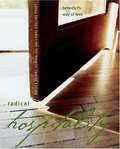- Table View
- List View
Racializing Jesus: Race, Ideology and the Formation of Modern Biblical Scholarship (Biblical Limits)
by Shawn KelleyShawn Kelley's groundbreaking study shows how the major intellectual movements of the modern world, such as Orientalism and romantic nationalism, become infused with the category of race. He then traces the processes through which racially-grounded thinking has influenced modern biblical scholarship.Dynamic and thought-provoking, the book incorporates a wide range of current debate, from critical race theory to the relationship between Martin Heidegger and National Socialism. It will give every student and scholar of biblical studies awareness of the subtle ways in which racial thinking has permeated their discipline, and encourage them to create new modes of biblical analysis.
Racing Toward Armageddon: The Three Great Religions and the Plot to End the World
by Michael BaigentThe bestselling author uncovers fundamentalists of all religions who are setting much of the world’s political agenda in their race toward the end times.In Racing Toward Armageddon, Michael Baigent, the New York Times–bestselling author of The Jesus Papers and Holy Blood, Holy Grail, exposes the conspiracy of religious extremists in the Holy Land and their efforts to bring about the end of the world in our lifetime. Baigent warns against the many diverse, public, and clandestine figures who are driving this perilous messianic message forward, and poses a pressing question: can we really afford to remain oblivious much longer?
Racing With Giants
by Mike HembreeHeroes of the racetrack-and heroes of faith.The growing and immense popularity of NASCAR speaks to its very human, yet iconic stars. In Racing with Giants, veteran sportswriter Mike Hembree pairs stories from the lives of NASCAR heroes with heroic tales from the Bible, with inspiring and faith-affirming results. Accented with vibrant photography, prayers, activities, and fun facts, Racing with Giants is a must-buy for the NASCAR fan in your life, or for anyone wanting to let God steer them to success.
Racing to Win: Establish Your Gameplan for Success
by Ken Abraham Joe GibbsA companion resource to Joe Gibbs's dynamic book, the Racing to Win Study Guide elaborates on the biblical foundation of the cornerstone principles for success found at the end of each chapter. Each of eight study sessions includes: - Race Preparation -- Identify and reflect upon a personal experience relating to the session's topics. - Starting Line -- Engage the author's concepts and related biblical passages. - Behind the Wheel -- Put the book's principles into practice. - Final Lap -- Discover a truth you can integrate into your life with confidence. A personal prayer addresses that truth.
Racism and God-Talk: A Latino/a Perspective
by Ruben Rosario Rodriguez2011 Winner of the Book Awards Contest in the Discipline of Theology Presented by Alpha Sigma Nu The apostle Paul wrote that "All of you are one in Christ Jesus." Given Paul’s vision of God’s kingdom defined by the breakdown of all distinctions and relationships of domination—no longer Jew or Greek, slave or free, male or female—how do we make sense of ethnic particularity within the church’s theological formulations?Racism and God-Talk explores the biblical and religious dimensions of North American racism while highlighting examples of resistance within the Christian religious tradition. Social historians have seldom analyzed the problematic of race from a primarily theological perspective. This volume undertakes a critical examination of explicitly theological and confessional perspectives for understanding and transforming North American racism.Rosario Rodriguez offers insights from Latino/a theology for broader scholarly and social discussions concerning racism, borders, and immigration. The first to analyze race and racism from a Latino/a theological perspective, the volume makes use of a broadened conceptualization of "mestizaje," or mutual cultural exchange, to challenge the church to recognize the effects of racial and ethnic particularity in all theological construction.
Racism and the Image of God
by Karen TeelFrom her perspective as a white feminist theologian, Karen Teel dialogues with five womanist thinkers to develop a Christian theology of the body that can compel Christians, especially U. S. Christians of European descent, to actively resist the sin of racism.
Racism and the Weakness of Christian Identity: Religious Autoimmunity (Routledge New Critical Thinking in Religion, Theology and Biblical Studies)
by David KlineDespite the command from Christ to love your neighbour, Western Christianity has continued to be afflicted by the evil of racism and the acts of violence that accompany it. Through a systems theoretical and deconstructive account of religion and the political theology of St. Paul, this book traces how the racism and violence of modern Western Christianity is a symptom of its failure to secure its own myth of sovereignty within a complex world of plurality. Divided into three sections, the book begins with a philosophical and critical account of what it calls the immune system of Christian identity. Focusing on Pauline political theology as reflective of an inherent religious "autoimmunity" built into Christian community, a theory of theological-political violence is located within Western Christianity. The second section traces major theoretical aspects of the historical "apparatus" of Christian Identity. It demonstrates that it is ultimately around the figure of the black slave that racialized Christian identity becomes a system of anti-blackness and white supremacy. The book concludes by offering strategies for thinking resistance against such racialised Christian identity. It does this by constructing a "pragmatics of faith" by engaging Deleuze’s and Guattari’s use of the term pragmatics, Moten’s theory of black fugitivity, and Long’s account of African American religious production. This wide-ranging and interdisciplinary view of Christianity’s relationship to racism will be of keen interest to scholars of Religious Studies, Theological Studies, Cultural Studies, Critical Race Studies, American Studies, and Critical Theory.
Radiance from Halcyon: A Utopian Experiment in Religion and Science
by Paul Eli IveyIn May 1904, the residents of Halcyon—a small utopian community on California&’s central coast—invited their neighbors to attend the grand opening of the Halcyon Hotel and Sanatorium. As part of the entertainment, guests were encouraged to have their hands X-rayed. For the founders and members of Halcyon, the X-ray was a demonstration of mysterious spiritual forces made practical to human beings. Radiance from Halcyon is the story not only of the community but also of its uniquely inventive members&’ contributions to religion and science. The new synthesis of religion and science attempted by Theosophy laid the foundation for advances produced by the children of the founding members, including microwave technology and atomic spectral analysis. Paul Eli Ivey&’s narrative starts in the 1890s in Syracuse, New York, with the rising of the Temple of the People, a splinter group of the theosophical movement. After developing its ideals for an agricultural and artisanal community, the Temple purchased land in California and in 1903 began to live its dream there. In addition to an intriguing account of how a little-known utopian religious community profoundly influenced modern science, Ivey offers a wide-ranging cultural history, encompassing Theosophy, novel healing modalities, esoteric architecture, Native American concepts of community, socialist utopias, and innovative modern music.
Radiance: Creative Mitzvah Living
by Danny SiegelThe Selected Prose and Poetry of Danny Siegel This first anthology of the most important writings by Danny Siegel, spanning and renewing fifty years of his insights intersperses soulful Jewish texts with innovative Mitzvah ideas to rouse individuals and communities to transform our lives, communities, neighborhoods, and world. As a renowned teacher Siegel describes the creative—often startling—ways individuals from different walks of life have brought compassion into the world, recognizes them as Mitzvah heroes, and suggests how we can apply their life lessons. He also plumbs how giving enriches living and presents Jewishly informed best principles for doing more world repair (Tikkun Olam). As a scholar of rabbinic literature Siegel offers translations and commentaries on Jewish texts illuminating Tzedakah, values, caring, and leadership. In addition he tops off a half-century of his thought with five new essays reflecting on his visions for a better world. The selected poetry asks religious and theological questions in the face of oppression and war, gives voice to personal moments often neglected by ritual, and exults at the wonders of modern Israel and the revelation of love. Both inspirational and pragmatic, this anthology offers practical guidance on using Siegel&’s classic and novel works in personal living and in Jewish organizational settings. Ultimately, in exploring the dynamic interaction between heroes, texts, and ourselves, Siegel seeks to engage each of us in discovering our own radiant potential for creative Mitzvah living.
Radiant Church: Restoring the Credibility of Our Witness
by Tara Beth LeachSomething is not right. The witness of the church in North America is eroding. Many Christians are alarmed by the decline in church attendance and seek a culprit. Too often, we point the finger away from the church, make culture the enemy, and build walls between us and others. But our antagonism and enemy-making are toxins that further eat away at our witness. Is there a better way? Tara Beth Leach could easily be one of those millennials giving up on the church. Instead, she is a pastor who loves the church and is paradoxically hopeful for its future. In an era where the church has lost much of its credibility, Leach casts a radiant vision for Christians to rediscover a robust, attractive witness. We need to name the toxic soil we've grown in, repent for past wrongs, and lean into a better way to become the church that Jesus proclaimed we would be. Leach casts down idolatrous false images of God to recover a winsome picture of a kingdom of abundance and goodness. We can be sustained by practices that will tune our hearts to God's and form us into the radiant communities God intends for us and those around us.
Radiant Faith: A 52-Week Devotional Journey for Teen Girls
by M.J. FievreA Radiant Daily Devotional for Teenage Girls#1 New Release in Teen & Young Adult Biblical StudiesRadiant Faith by M.J. Fievre is a 52-week devotional guide designed to help teenage girls deepen their faith and spiritual connection. By incorporating personal stories, scripture, and prayer, this guide aims to inspire and empower teenage girls to live confidently in their faith.Seeking an empowering daily devotional for spiritual and personal growth?Radiant Faith is the christian journal book to kickstart your spiritual journey. With daily readings, reflection questions, and journaling pages, you’ll grow your faith and connection with God. Thrive with this spiritual and personal growth book. This 52-week devotional for teenage girls equips teenage readers with tools and questions to ignite their passion for God while building confidence and resilience in their faith. Inside, you’ll find:52 weekly Christian devotionals exploring crucial themes for teenage girlsPractical advice and encouragement to help teenage girls navigate daily challengesRelatable stories and reflection questions that foster a sense of identity and sisterhoodIf you're looking for Christian books or books for teenage girls, add this to your cart! If you liked Fearless Faith, Choose Kindness, or Prayers for Calm, you’ll love Radiant Faith.
Radiant Glory: The Life Story of Martha Wing Robinson
by Gordon P. GardinerRadiant Glory: The Life of Martha Wing Robinson by Gordon P. Gardiner is the only existent biography of Martha Wing Robinson (1874-1936), a relatively unknown woman from the Mid-West who was healed of several severe maladies under the ministry of John Alexander Dowie, and was then led by God into the Pentecostal outpouring in 1906. Gordon P. Gardiner spent over 20 years writing this detailed account of Martha Wing Robinson's life, drawing from personal remembrances as a boy and young man in Illinois, as well as numerous interviews with Martha Wing Robinson's closest associates, sheaves of correspondence, and notes and dictations of her talks. It pays special attention given to her writings and talks after her tremendous experience in 1907, right up to her death in 1936.
Radiant Truths
by Jeff SharletLouisa Catherine Johnson Adams, wife and political partner of John Quincy Adams, became one of the most widely known women in America when her husband assumed office as sixth president in 1825. Shrewd, intellectual, and articulate, she was close to the center of American power over many decades, and extensive archives reveal her as an unparalleled observer of the politics, personalities, and issues of her day. Louisa left behind a trove of journals, essays, letters, and other writings, yet no biographer has mined these riches until now. Margery Heffron brings Louisa out of the shadows at last to offer the first full and nuanced portrait of an extraordinary first lady. The book begins with Louisa's early life in London and Nantes, France, then details her excruciatingly awkward courtship and engagement to John Quincy, her famous diplomatic success in tsarist Russia, her life as a mother, years abroad as the wife of a distinguished diplomat, and finally the Washington, D.C., era when, as a legendary hostess, she made no small contribution to her husband's successful bid for the White House. Louisa's sharp insights as a tireless recorder provide a fresh view of early American democratic society, presidential politics and elections, and indeed every important political and social issue of her time.
Radiate
by Marley GibsonHayley Matthews is determined to be the best cheerleader she can. She works hardand pushes herself 110% all the time.Then Hayley finds a lump on her leg. The diagnosis is cancer. The prognosis isunclear. She could lose her leg. Or maybe her life.At first Haley is scared, terrified. In an instant, everything she's worked for seemsout of reach. But Haley is strong. She's going to fight this disease. She will not let ittake her life or her dreams.
Radical Acceptance: Embracing Your Life With The Heart Of A Buddha
by Tara BrachIn our current times of global crises and spiking collective anxiety, Tara Brach&’s transformative practice of Radical Acceptance offers a pathway to inner freedom and a more compassionate world. This classic work now features an insightful new introduction, an exclusive bonus chapter, and additional guided meditations. &“Radical Acceptance offers us an invitation to embrace ourselves with all our pain, fear, and anxieties, and to step lightly yet firmly on the path of understanding and compassion.&”—Thich Nhat Hanh &“Believing that something is wrong with us is a deep and tenacious suffering,&” says Tara Brach at the start of this illuminating book. This suffering emerges in crippling self-judgments and conflicts in our relationships, in addictions and perfectionism, in loneliness and overwork—all the forces that keep our lives constricted and unfulfilled. Radical Acceptance offers a path to freedom, including the day-to-day practical guidance developed over Dr. Brach&’s forty years of work with therapy clients and Buddhist students. Writing with great warmth and clarity, Tara Brach brings her teachings alive through personal stories and case histories, fresh interpretations of Buddhist tales, and guided meditations. Step by step, she shows us how we can stop being at war with ourselves and begin to live fully every precious moment of our lives.
Radical Ambivalence: Race in Flannery O'Connor (Studies in the Catholic Imagination: The Flannery O'Connor Trust Series)
by Angela Alaimo O'DonnellRadical Ambivalence is the first book-length study of Flannery O’Connor’s attitude toward race in her fiction and correspondence. It is also the first study to include controversial material from unpublished letters that reveals the complex and troubling nature of O’Connor’s thoughts on the subject. O’Connor lived and did most of her writing in her native Georgia during the tumultuous years of the civil rights movement. In one of her letters, O’Connor frankly expresses her double-mindedness regarding the social and political upheaval taking place in the United States with regard to race: “I hope that to be of two minds about some things is not to be neutral.” Radical Ambivalence explores this double-mindedness and how it manifests itself in O’Connor’s fiction.
Radical Assimilation in the Face of the Holocaust: Otto Heller (1897–1945) (SUNY series in Contemporary Jewish Thought)
by Tom NavonThis book explores the confrontation of radically assimilated Jews with the violent collapse of their envisioned integration into a cosmopolitan European society, which culminated during the Holocaust. This confrontation is examined through the biography of the German-speaking intellectual and prominent communist theoretician of the Jewish question Otto Heller (1897–1945), focusing on the tension between his Jewish origins and his universalistic political convictions. Radical Assimilation in the Face of the Holocaust traces the development of Hellerʼs position on the Jewish question in three phases: how he grew up to become a typical Central European "non-Jewish Jew" (1897–1931); how he became exceptional in that category by focusing his intellectual work on the Jewish question (1931–1939); and how he reacted to the persecution and murder of European Jewry as a member of the Resistance in occupied France and in Auschwitz (1939–1945). Breaking with the common portrayal of Heller as a self-hating Jew, Tom Navon argues instead that Heller came to lay the foundations for the groundbreaking recognition by communists of worldwide Jewish national solidarity.
Radical Christian Living
by Richard BookerBible study on discipleship. Includes several outlines on Christian doctrine with Scripture references.
Radical Compassion: Learning to Love Yourself and Your World with the Practice of RAIN
by Tara BrachOne of the most beloved and trusted mindfulness teachers in America offers a lifeline for difficult times: the RAIN meditation, which awakens our courage and heartTara Brach is an in-the-trenches teacher whose work counters today's ever-increasing onslaught of news, conflict, demands, and anxieties--stresses that leave us rushing around on auto-pilot and cut off from the presence and creativity that give our lives meaning.In this heartfelt and deeply practical book, she offers an antidote: an easy-to-learn four-step meditation that quickly loosens the grip of difficult emotions and limiting beliefs. Each step in the meditation practice (Recognize, Allow, Investigate, Nurture) is brought to life by memorable stories shared by Tara and her students as they deal with feelings of overwhelm, loss, and self-aversion, with painful relationships, and past trauma--and as they discover step-by-step the sources of love, forgiveness, compassion, and deep wisdom alive within all of us.
Radical Compassion: Shambhala Publications Authors on the Path of Boundless Love
by Shambhala PublicationsWhat is compassion? Much more than just being nice, compassion is about looking deeply at ourselves and others and recognizing the fundamental goodness we all share. It’s about opening up to the vulnerable space inside every one of us and letting our barriers down. And it’s about daring to be present to ourselves and others with genuine love and kindness. Empowering personal awakening and social change, it might be the most radical and transformative thing we can do.The cultivation of compassion has long been at the core of Naropa University’s mission, since its origins in 1974—and its students and faculty have been leaders in contemplative education with heart. In celebration of Naropa’s fortieth anniversary, Shambhala Publications is pleased to offer these teachings on the path of compassion from a collection of authors who have helped shape the school’s unique and innovative identity, including: • Chögyam Trungpa on opening ourselves more and more to love the whole of humanity • Dzogchen Ponlop on how to cultivate altruism with the help of a spiritual mentor • Judith L. Lief on the common obstacles to compassion and how to overcome them • Gaylon Ferguson on awakening human-heartedness in oneself and society amidst everyday life • Diane Musho Hamilton on connecting to natural empathy and taking a compassionate approach to conflict resolution • Reginald A. Ray on spiritual practices for developing the enlightened mind and heart in the Mahayana Buddhist tradition • Ringu Tulku on the practices of bodhisattvas, those who devote themselves to the path of enlightenment for the sake of all beings • Pema Chödrön on building up loving-kindness for oneself and others with help from traditional Buddhist slogans • Ken Wilber on what it really means to be a support person, with reflections from his own life • Karen Kissel Wegela on avoiding caregiver’s burnout and staying centered amidst our efforts to help those in need • and reflections on Naropa University and the meaning of radical compassion from longstanding faculty member Judith Simmer-Brown
Radical Dharma: Talking Race, Love, and Liberation
by Jasmine Syedullah Rev Angel Kyodo Williams Lama Rod OwensIgniting a long-overdue dialogue about how the legacy of racial injustice and white supremacy plays out in society at large and Buddhist communities in particular, this urgent call to action outlines a new dharma that takes into account the ways that racism and privilege prevent our collective awakening. The authors traveled around the country to spark an open conversation that brings together the Black prophetic tradition and the wisdom of the Dharma. Bridging the world of spirit and activism, they urge a compassionate response to the systemic, state-sanctioned violence and oppression that has persisted against black people since the slave era. With national attention focused on the recent killings of unarmed black citizens and the response of the Black-centered liberation groups such as Black Lives Matter, Radical Dharma demonstrates how social transformation and personal, spiritual liberation must be articulated and inextricably linked. Rev. angel Kyodo williams, Lama Rod Owens, and Jasmine Syedullah represent a new voice in American Buddhism. Offering their own histories and experiences as illustrations of the types of challenges facing dharma practitioners and teachers who are different from those of the past five decades, they ask how teachings that transcend color, class, and caste are hindered by discrimination and the dynamics of power, shame, and ignorance. Their illuminating argument goes beyond a demand for the equality and inclusion of diverse populations to advancing a new dharma that deconstructs rather than amplifies systems of suffering and prepares us to weigh the shortcomings not only of our own minds but also of our communities. They forge a path toward reconciliation and self-liberation that rests on radical honesty, a common ground where we can drop our need for perfection and propriety and speak as souls. In a society where profit rules, people's value is determined by the color of their skin, and many voices--including queer voices--are silenced, Radical Dharma recasts the concepts of engaged spirituality, social transformation, inclusiveness, and healing.From the Trade Paperback edition.
Radical Disciple: Father Pfleger, St. Sabina Church, and the Fight for Social Justice
by Robert McCloryDuring the past twenty-six years, Reverend Michael Pfleger, a white Catholic priest who pastors a black Chicago parish, has never been far from the spotlight. His aggressive, innovative leadership has empowered thousands, making St. Sabina church one of the largest and most active black Catholic congregations in the country. At the same time, Pfleger has been continually criticized as a trouble-making maverick, a renegade cleric, and a publicity hound. This biography concentrates on Father Pfleger's work at St. Sabina from his earliest days there and covers his efforts to build up the parish, his activism, his work to rejuvenate the community, his battles with church leaders, and his strong relationship with his parishioners. It provides a fascinating look at the inner workings of the Catholic Church, the traditions of the black pulpit, and what it takes to change the laws in a major American city. Radical Disciple will be essential reading for anyone interested in social change and how a dynamic preacher and an involved church community can transform a city.
Radical Forgiveness: God's Call to Unconditional Love
by Brian ZahndRecover the true beauty of Christianity as found in forgiveness. If Christianity is to be a compelling and relevant voice in the twenty-first century, it needs a fresh message. Not a new innovation or novel interpretation, but a return to our roots. For if Christianity is not about forgiveness, it’s about nothing at all. Beginning with the horror of the Holocaust, Radical Forgiveness explores what forgiveness means--and how far it should go--in the real world of rape, child abuse, genocide, and other atrocities. With honesty and compassion Zahnd tackles questions such as... Should we always forgive? Is forgiveness always even possible? Does forgiveness enable evil? Does it sacrifice justice? Are there ANY limits? Pushing you beyond intellectual exercises, Radical Forgiveness will challenge your thinking by juxtaposing absolutely bottom-line examples with the simple question: What would you do? Previously published as Unconditional?
Radical Gratitude
by Ellen VaughnHappily, developing a habitually grateful heart is not a discipline to be mastered or another reason to feel guilty and stressed. A grateful heart is a gift of grace. This book is not about seven quick steps to spiritual power. The author has found, over and over, that the rhythm of real divine renewal beats in the pulse of a grateful human heart.
Radical Hospitality: Benedict's Way of Love
by Daniel Homan Lonni Collins PrattThe book explains the true meaning of hospitality as it should be lived by everyone. Beautiful and thought-provoking.
